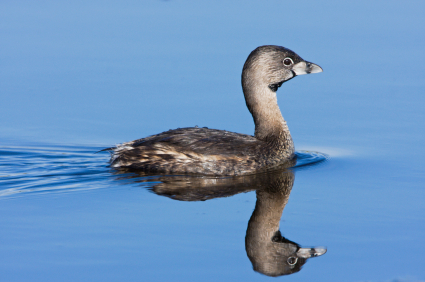Every spring an odd duck shows up around here. There’s a small lake nearby, or a big pond, or something in between. It’s got a green-brown elemental beauty that comes from being the real deal—a spring-fed woodland watering hole and wildlife attractor.
Fish big and small can be seen moving under the surface, busy at inscrutable fish business. Turtles sun themselves on logs near shore and fat frogs lie on lily pads. Birds are attracted. Ospreys and Bald Eagles rarely. But commonly we get cormorants, kingfishers, redwing blackbirds and all kinds of ducks.
One little brown duck just paid a seasonal visit. Not only does this duck not live here, but it’s not actually a duck.
When you see this little transient, your first thought is “a duck.” Yet it’s some other kind of bird, as two-fisted bird watchers know. We’ll mention what kind in a moment. But first we gotta reflect on how this bird is mis-identified with some justification.
There’s folk wisdom that goes, more or less: “If it swims like a duck and walks like a duck and quacks like a duck, it’s a duck.” That persistent observation was coined by the famous old poet James Whitcomb Riley, a guy who wrote widely in the 1800s and early 1900s. Funny how so many literary immortals have three names. (Henry David Thoreau, Edgar Allen Poe…). If he simply went by Jim Riley, would we be talking about him in this far future of ours?
Whatever, James Whitcombe Riley was pretty famous for a while and his “duck” quote of dubious wisdom stayed in our culture and was used and mis-used in many ways over the years. Point is, if you see our pond’s migratory visitor in spring or fall around here, you might think it’s a duck.
But it’s not. Even though, James Whitcomb Riley would say you’re perfectly right in thinking so. It’s a “grebe.” A reassuring seasonal sighting, and also a great word. “Grebe.” Speak it proudly. Show you know what you’re looking at, and it ain’t a duck.
What kind of grebe? An odd duck of a question, not heard every day. The grebes of the world come in more than twenty varieties. Ours is a “Pied-billed” Grebe, because its bill has a color pattern that old-timers described as “pied.” Whatever, this floating duck-like bird is a grebe. (Incredibly, a distant cousin of flamingos).
But to all the world, and to most of the people around here—it’s some kind of duck. And that’s okay. We know the truth, and we like knowing the names of what we see. But more than that—we appreciate this grebe showing up here like clockwork in spring and fall. Floating like a duck on our little lake, leaving a wake, leaving a memory.


I like that Pied-billed grebe.
Now we know!! Good one!
A very entertaining and informative piece of aviary, wildlife and literary lore.